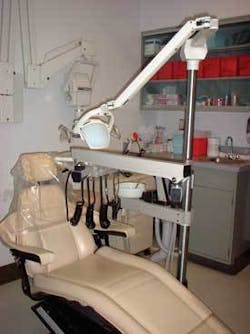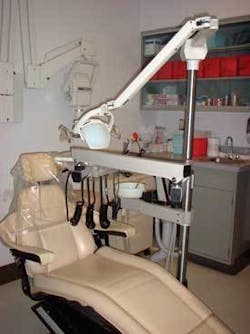Prison dental hygiene
by Christine Nathe, RDH, MS
Pamela Myers has worked as a dental hygienist in the Texas Prison System for more than 20 years. She graduated from Wharton County Junior College in the 1970s and worked in private practice before going into public health. She is a member of Phi Theta Kappa National Society for Junior Colleges and Alpha Chi National Honor Society.
Pamela is a Certified Correctional Health Provider and was instrumental in adding a referral for dental evaluations to the UTMB-CMC Disease Management Guidelines for Diabetes and Coronary Artery Disease. In fact, she will be presenting a paper titled “Diabetes Disease Management and Dental Care: A Transdisciplinary Approach” at the National Commission on Correctional Health Care Conference in Orlando, Fla., on May 8. She answered some questions we had about her career below.
Why did you go into dental hygiene?
In 1970, I worked at a local dental office as a part-time dental assistant. I really loved working in dentistry and discovered I enjoyed working with people. My husband was drafted into the Army later in the year. I moved back home with my parents and went to work for my previous dentist as an assistant. The dentist’s wife was his hygienist, and they both encouraged me to pursue a career in dental hygiene.
I applied to Wharton County Junior College Dental Hygiene Program in 1972 after my husband returned from the armed services, and graduated in 1974 with an associate’s degree in dental hygiene. The first dental office I practiced in was in Huntsville, Texas. I was blessed to practice with an excellent dentist who was highly motivated and truly believed in the preventive philosophy.
How did you get into dental public health? Did you need additional education?
Huntsville, Texas, is the headquarters for the Texas Department of Criminal Justice. Some of the local private general dentists, including the practitioner I worked with, practiced at the prison a couple of hours each morning. I heard stories, learned about interesting cases, and was very curious about the care provided. In 1981 as a result of a federal court case, the state had to make numerous changes in the prison operations, including health care. Until 1981, nursing care, mid-level care, and all dental hygiene care was provided by inmates who were not licensed, all dental assistants were inmates, and all clerical support personnel were incarcerated individuals. The court ruled that no inmate could provide care, handle health records, or in any way be involved in the delivery of health care.
My employer had combined his office with two other dentists in the late 1970s. Two of the practitioners worked for the Texas Department of Corrections (DOC). They told me that the DOC was hiring registered dental hygienists. I had already learned about the great benefits package and the wonderful hours the state offered. I applied for a position in 1983 and was offered a job at the Diagnostic Unit in Huntsville. My husband, who was in law enforcement at the time, was upset and said I would not be safe or happy with the position within six months. He talked me into declining the job offer.
Three years elapsed and I was still very interested in working in corrections. I applied again for a vacant position at the Wynne Unit in Huntsville and was offered the position. This time I accepted, again over my husband’s objections. I worked 7 a.m. to 3:30 p.m. Monday through Friday. I had every holiday off and received 12 days of paid sick leave per year plus more than two weeks of vacation. The vacation increased over the years and I now receive over four weeks paid vacation and still have holidays off and paid sick leave. After over 20 years, I am still behind the walls, barbed wire and fences, and it has been the most rewarding career I could have ever dreamed.
By the way, I am still married to the same wonderful guy after 37 years. He retired as sheriff of this county a few years ago after 27 years in law enforcement, and he will tell you that he was wrong about encouraging me to decline the original job offer. After I had worked at the Wynne unit for six months, my husband told me that I was more relaxed, less stressed, and happier than I had ever been and he was glad I had made the career change.
What are your current positions?
In 1986 I was named the Dental Hygiene Coordinator for the Texas Department of Criminal Justice. At that time, the DOC had over 24 facilities, nine of which were located within a 20-mile radius of Huntsville. The incarcerated population was about 32,000. The state was still in federal court and undergoing many changes. Over half of our dental hygiene positions were vacant and the courts were going to fine the state a specific amount each day if the positions remained open. So I became a recruiter overnight. My position is still evolving.
My official job description requires a current Texas dental hygiene license, a minimum of five years of correctional dental hygiene experience, and a bachelor’s degree can be considered in lieu of three years of the correctional experience. When I retire, the position will be posted with similar requirements. While beneficial, a bachelor’s degree would not be the only consideration in the correctional environment. The majority of our hygienists have two-year degrees. I believe that will change in the future.
I am excited about the Advanced Dental Hygiene Practitioner (American Dental Hygienists’ Association initiative to create an optional dental hygiene career). I believe this will become a reality, and that this advanced type of practitioner will be welcomed into the public health arena. I already envision the ADHP entering the correctional environment and enhancing access to care.
Most incarcerated individuals come from a lower socio-economic background, have less then a high school education, and are most at risk for developing serious health problems. The majority of inmates come from the population that has the least access to care.
Currently, I am employed by the University of Texas Medical Branch-Correctional Managed Care, and my official job title is Manager, Dental Hygiene Program.
As the Dental Hygiene Program Manager I still wear a number of different hats. For many years, we provided care only to an adult incarcerated population, then we assumed the health care in the Texas Youth Commission, the juvenile correctional system. UTMB-CMC provides care in the Federal Bureau of Prisons Complex in Beaumont, Texas, so I have learned about the differences in the federal and state prisons.
The growth from a population of 32,000 to one of over 125,000 in the UTMB sector has been challenging. I coordinate all of the continuing education programs for the entire dental staff, and manage the preventive care provided by UTMB-CMC. I make decisions regarding materials, instruments, and equipment used in our clinics. I develop policies and participate on the dental utilization quality review committee. We operate the largest electronic medical record in the world. This electronic health network has been recognized at the state level in Texas and received national recognition for innovation in technology.
I present to dental hygiene students at more than one school in Texas regarding career choices, and I participate in recruiting. I have been involved in studies on plaque control, access to care, and periodontal disease, and have published articles in RDH and Correct Care. However, one of the most interesting articles that I wrote was not for a professional journal, but for Chicken Soup for the Dental Soul.
Can you discuss any particularly interesting experiences you have had in your dental public health position?
Security is paramount in a correctional institution, and some days I feel like a correctional officer. We must maintain a continual count of all instruments, needles, and blades. All of our cabinets and drawers are locked. Products like antimicrobial mouthwash must be issued in a unit dose, and the offender must be observed while swishing and expectorating.
We do not send the patient “home” with a bottle of chlorhexidine or even disclosing tablets. When evaluating preventive and home care products like toothbrushes and dental floss, we can make recommendations to the DOC, but the product has to be evaluated for security risks. The offenders cannot have regular floss; instead they have a floss pick they can purchase in the commissary. The toothbrushes are about 3.5 inches long and have a spoon shaped handle as a long handle can be sharpened on a concrete floor and made into a weapon.
What type of advice would you give practicing hygienists who are thinking of doing something different?
Hygienists who are interested in making a difference should explore all the opportunities available. They should pursue a higher level of education, as most opportunities other than private practice require a bachelor’s or master’s degree. They need to learn and grow as much as possible, participate in state or national dental hygiene conventions, and network with providers in public as well as private health sales. They need to read as much as possible because knowledge truly is power.
Christine Nathe, RDH, MS, is a professor and graduate program director at the University of New Mexico, Division of Dental Hygiene, in Albuquerque, N.M. She is also the author of “Dental Public Health,” (www.prenhall.com/nathe), which is in its second edition with Prentice Hall. She can be reached at [email protected] or (505) 272-8147.


